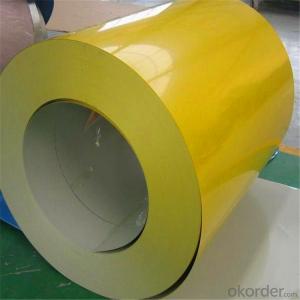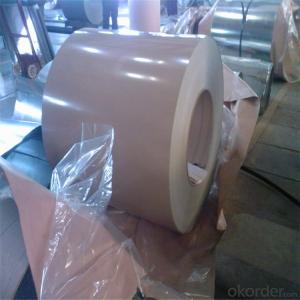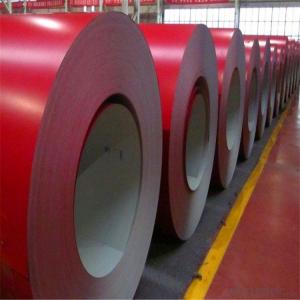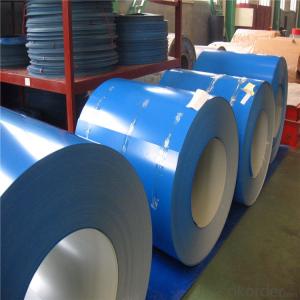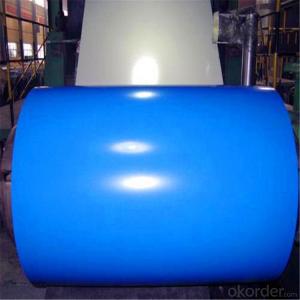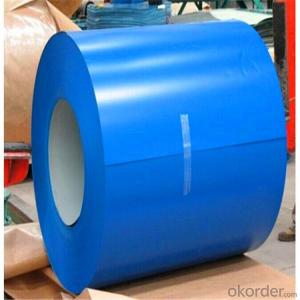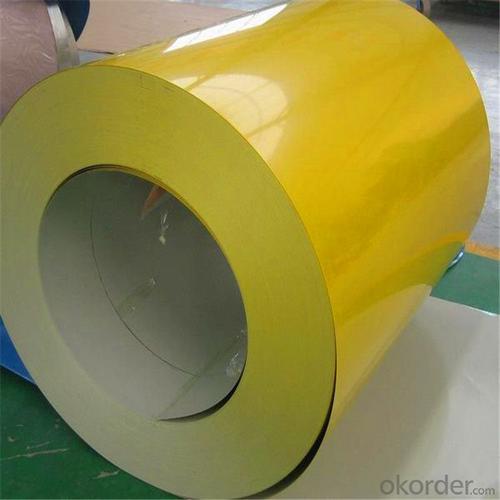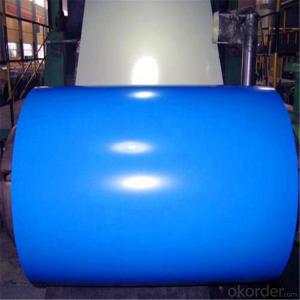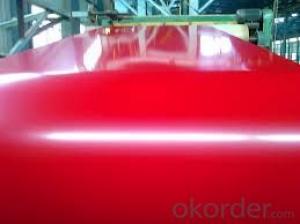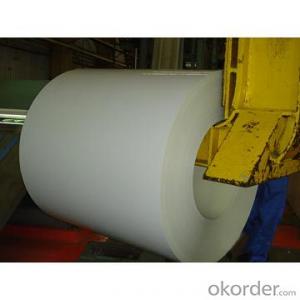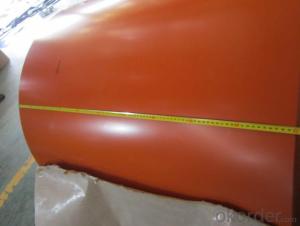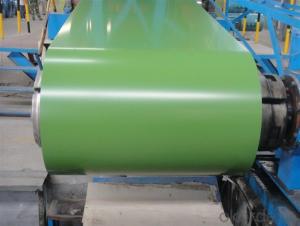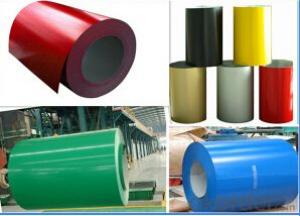Prime Pre-painted Galvanized Steel Coil PPGI
- Loading Port:
- Tianjin
- Payment Terms:
- TT OR LC
- Min Order Qty:
- 100 watt
- Supply Capability:
- 50000 watt/month
OKorder Service Pledge
OKorder Financial Service
You Might Also Like
Specification
Prime Pre-painted Galvanized Steel Coil PPGI
Description of Prime Pre-painted Galvanized Steel Coil PPGI
Product | PPGI/PPGL |
Capacity | 5,000 tons/month |
Base material | Hot dipped galvanized steel |
Thickness | 0.2-2.0mm |
Width | 600-1250mm(according to your need) |
Coil Weight | 3-6tons |
Quality | SGCC, DX51D |
Color | RAL No. or customers samples’ color |
Zinc-coating | 30g/m2-180g/m2 |
Coil ID | 508mm/610mm |
Technique | Cold rolled—hot dipped galvanized—color coated |
Painting | Top painting:15~25μm |
Back painting: 6~10μm | |
Tolerance | Thickness: +/-0.02mm |
Width:+/-2mm | |
Shipment time | within 15-45 workdays |
Payment | T/T, L/C at sight |
Packing | Standard export packing |
The special order can be negotiated. | |
Application of Prime Pre-painted Galvanized Steel Coil PPGI
APPLICATION OF OUR PREPAINTED STEEL | ||||||||||
Construction | Outside | Workshop,agricultural warehouse,residential precast unit | ||||||||
corrugated roof,roller shutter door,rainwater drainage pipe,retailer booth | ||||||||||
Inside | Door,doorcase,light steel roof stucture,folding screen,elevator,stairway,ven gutter,Construction Wall | |||||||||
Electrical applicance | Refrigerator,washer,switch cabnet,instrument cabinet,air conditioning,micro-wave owen,bread maker | |||||||||
Fuiniture | Central heating slice,lampshade,chifforobe,desk,bed,locker,bookself | |||||||||
Carrying trade | Exterior decoration of auto and train,clapboard,container,isolation lairage,isolation board | |||||||||
Qthers | Writing panel,garbagecan,billboard,timekeeper,typewriter,instrument panel,weight sensor,photographic equipment | |||||||||
Products Show of Prime Pre-painted Galvanized Steel Coil PPGI

Product Advantages
1.With nearly 20 years experience in prepainted steel, accommodate different marketdemands. | ||||||||||||||
2.'Quality first, service first' is our business aim; 'The good faith get respect,cast quality market' is our Business philosophy . | ||||||||||||||
3.Having two series producttion line,with the abbual production capacity of 240000 tons. | ||||||||||||||
4.Exceed International ISO9001:2008&ISO14001:2004 quality and environmental standards | ||||||||||||||
5.Meet with ROHS standard |
Company Information
CNBM International Corporation is the most important trading platform of CNBM group.
Whith its advantages, CNBM International are mainly concentrate on Cement, Glass, Iron and Steel, Ceramics industries and devotes herself for supplying high qulity series of refractories as well as technical consultancies and logistics solutions.


F A Q
1, Your advantages?
professional products inquiry, products knowledge train (for agents), smooth goods delivery, excellent customer solution proposale
2, Test & Certificate?
SGS test is available, customer inspection before shipping is welcome, third party inspection is no problem
3, Factory or Trading Company?
CNBM is a trading company but we have so many protocol factories and CNBM works as a trading department of these factories. Also CNBM is the holding company of many factories.
4, Payment Terms?
30% TT as deposit and 70% before delivery.
Irrevocable L/C at sight.
5, Trading Terms?
EXW, FOB, CIF, FFR, CNF
6, After-sale Service?
CNBM provides the services and support you need for every step of our cooperation. We're the business partner you can trust.
For any problem, please kindly contact us at any your convenient time.
We'll reply you in our first priority within 24 hours.
- Q: What are the requirements for special steel used in pharmaceutical manufacturing?
- The requirements for special steel used in pharmaceutical manufacturing include high corrosion resistance, excellent cleanliness and hygiene, resistance to high temperatures and chemicals, and compliance with strict regulatory standards such as Good Manufacturing Practices (GMP). Additionally, the steel must be able to maintain the integrity of the pharmaceutical products, ensuring their purity and preventing contamination.
- Q: How does special steel contribute to the renewable energy equipment industry?
- Special steel plays a crucial role in the renewable energy equipment industry by providing the necessary strength, durability, and corrosion resistance required for various components. One of the key applications of special steel in this industry is in wind turbines. Wind turbine towers, blades, and gearboxes are all manufactured using special steel alloys due to their high tensile strength and resistance to fatigue. This enables wind turbines to withstand the harsh environmental conditions and operate efficiently for prolonged periods. Moreover, special steel is also extensively used in the production of solar power equipment. Solar panels are often framed using stainless steel, which offers excellent corrosion resistance and structural stability, ensuring their longevity and performance in outdoor environments. Additionally, special steel alloys are employed in the manufacturing of solar trackers, which enable solar panels to follow the sun throughout the day, optimizing their energy generation potential. In the hydroelectric power industry, special steel is employed in the construction of turbine components, such as blades, shafts, and casings. These components are subjected to high pressures, water flow, and abrasive wear, making the use of special steel essential to ensure their reliability and longevity. Furthermore, special steel is also utilized in the production of energy storage systems, such as batteries and fuel cells. These technologies require materials with high conductivity, corrosion resistance, and mechanical strength, making special steel alloys ideal for their construction. Overall, special steel contributes significantly to the renewable energy equipment industry by providing the necessary strength, durability, and corrosion resistance required for various components. Its utilization in wind turbines, solar panels, hydroelectric power systems, and energy storage technologies ensures the reliability and longevity of these equipment, ultimately promoting the growth and sustainability of the renewable energy sector.
- Q: What is the difference between general steel and special steel?
- Special steel: it is an important symbol to measure whether a country can become a steel power. It is the main steel used in most industries such as machinery, automobile, military industry, chemical industry, household electrical appliance, shipping, traffic, railway and new industries. China's special steel industry is responsible for the special steel products needed by the key industries such as defense industry, high and new technology industry and machinery and automobile industry. China manufacturing growth to provide a space for the development of domestic special steel, sustained and rapid development of manufacturing industry, especially in machinery, automobile, machinery, shipbuilding and other industries, the strong demand of special steel, become the direct impetus to support excellent steel market.
- Q: What are the properties of corrosion-resistant tool steel?
- Corrosion-resistant tool steel possesses a combination of properties that make it resistant to corrosion. These properties include high levels of chromium, which forms a protective oxide layer on the surface of the steel, preventing the penetration of corrosive substances. Additionally, corrosion-resistant tool steel often contains other alloying elements such as molybdenum, vanadium, and tungsten, which further enhance its resistance to corrosion. This type of steel also exhibits high hardness, strength, and wear resistance, making it suitable for use in various tools and applications where corrosion resistance is crucial.
- Q: Can special steel be used in the production of springs?
- Yes, special steel can be used in the production of springs. Special steel, such as alloy steel or high carbon steel, is often preferred for spring manufacturing due to its excellent strength, durability, and elasticity properties. This type of steel allows for the production of springs that can withstand high stress, maintain their shape, and provide reliable performance over an extended period of time.
- Q: How is spring steel used in the automotive industry?
- Spring steel is commonly used in the automotive industry for various purposes. It is primarily utilized to manufacture suspension systems, such as coil springs, leaf springs, and stabilizer bars. The unique properties of spring steel, including its high strength, elasticity, and resistance to deformation, allow these components to effectively absorb shocks and provide a smoother ride. Additionally, spring steel is also employed in the production of engine valves, seat frames, and steering components due to its durability and ability to withstand high temperatures and stress.
- Q: Can special steel be used in the textile manufacturing industry?
- Yes, special steel can be used in the textile manufacturing industry. It is commonly used in the production of textile machinery, such as knitting machines, looms, and sewing machines, due to its durability, strength, and resistance to wear and tear. Additionally, special steel can be used in the production of textile accessories, like needles and pins, to ensure precision and longevity.
- Q: How is special steel used in the power generation industry?
- Special steel is widely used in the power generation industry for various applications. It is utilized in the manufacturing of turbines, boilers, and other critical components due to its exceptional strength, heat resistance, and corrosion resistance properties. Special steel is crucial in ensuring the efficiency and reliability of power plants, enabling them to withstand high temperatures and pressures, while also minimizing downtime and maintenance costs.
- Q: What are the different methods of improving the fatigue resistance of special steel?
- There are several methods of improving the fatigue resistance of special steel, such as surface treatments, heat treatments, alloying, and grain refinement. Surface treatments like shot peening or nitriding can introduce compressive stresses on the surface, increasing the material's resistance to fatigue. Heat treatments, such as quenching and tempering, can improve the steel's hardness and strength, making it less susceptible to fatigue failure. Alloying with elements like chromium, molybdenum, or vanadium can enhance the steel's resistance to fatigue by improving its mechanical properties. Grain refinement techniques, like severe plastic deformation or precipitation hardening, can also improve fatigue resistance by reducing the size and distribution of grain boundaries in the steel. Overall, a combination of these methods can significantly enhance the fatigue resistance of special steel.
- Q: What industries commonly use special steel?
- Industries commonly using special steel include automotive, aerospace, construction, energy, and manufacturing.
Send your message to us
Prime Pre-painted Galvanized Steel Coil PPGI
- Loading Port:
- Tianjin
- Payment Terms:
- TT OR LC
- Min Order Qty:
- 100 watt
- Supply Capability:
- 50000 watt/month
OKorder Service Pledge
OKorder Financial Service
Similar products
Hot products
Hot Searches
Related keywords
